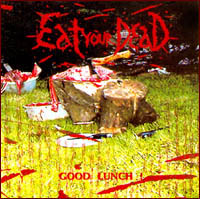EAT YOUR DEAD (FRA) - Good Lunch (2001)

Label : Autoproduction
Sortie du Scud : Décembre 2001
Pays : France
Genre : Brutal Deathcore
Type : Démo
Playtime : 4 Titres - 12 Mins
Eat Your Dead, jeune combo émergeant de Saint-Nazaire évoluant dans un style très Deathcore à imagerie et inspiration gore.
Le petit défaut de cette démo reste la production très faiblarde, par moment il est difficile de tout entendre distinctement mais le tout reste toutefois audible... Remarque ce n'est qu'une démo après tout, mais il faut dire qu'aujourd'hui la qualité des démos est souvent bonne, voir égale à des cd pro... Bref !
Cependant, les quatre titres de Good Lunch nous laissent présager un potentiel fort intéressant notamment dans la section rythmique et guitaristique...
En résumé, Eat Your Dead est à découvrir, à écouter et soutenir pour qu'il développe ce potentiel afin qu'il nous sorte un cd digne de leur niveau...
Ajouté : Vendredi 26 Juillet 2002
Chroniqueur : Blasphy De Blasphèmar
Score :   
Lien en relation: Eat Your Dead Website
Hits: 15744
|














